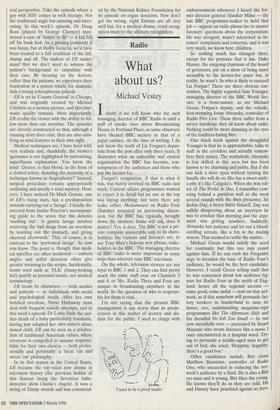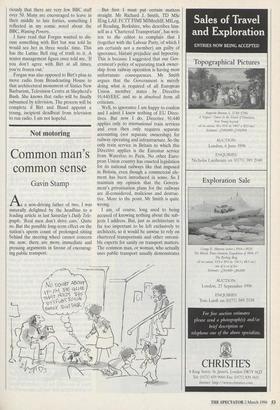Radio
What about us?
Michael Vestey
Idoubt if we will know who the next managing director of BBC Radio is until a puff of smoke rises above Broadcasting House in Portland Place, as some observers have likened BBC secrecy to that of a papal enclave. At the time of writing, I do not know the truth of Liz Forgan's depar- ture from the post after only three years. It illustrates what an unhealthy and cynical organisation the BBC has become, con- temptuous of the audiences and those who pay the licence fee.
Forgan's resignation, if that is what it was, was barely covered on BBC radio last week. Current affairs programmes wanted to report it in detail but no one at the top was saying anything; nor were there any leaks, either. Mediumwave on Radio Four (Sunday) mounted an interesting discus- sion, but the BBC has, typically, brought down the shutters. Some will ask, does it matter? Yes, it does. The BBC is not a pri- vate company answerable only to its share- holders; the viewers and listeners are, to use Tony Blair's hideous new phrase, stake- holders in the BBC. The managing director of BBC radio is more important in some ways than whoever runs BBC television.
On the whole, television viewers are not loyal to BBC 1 and 2. They can find pretty much the same stuff over on Channels 3 and 4, or Sky. Radio Three and Four are unique in broadcasting anywhere in the world. So the question of who is responsi- ble for them is vital.
I'm not saying that the present BBC management is any worse than its prede- cessors in this matter of secrecy and dis- dain for the public. I used to cringe with ' used to be a proof reader' embarrassment whenever I heard the for- mer director general Alasdair Milne — the last BBC programme-maker to hold that job — appear on radio phone-ins to answer listeners' questions about the corporation. He was arrogant, wasn't interested in lis- teners' complaints and concerns, and it was very much, we know best, children.
So nothing much has changed there, except for the pretence that it has. Duke Hussey, the outgoing chairman of the board of governors, put on a show of being more accessible to the licence-fee payer but, in reality, he wasn't. So who is likely to succeed Liz Forgan? There are three obvious con- tenders. The highly regarded Sam Younger, managing director of the BBC World Ser- vice, is a front-runner, as are Michael Green, Forgan's deputy, and the volatile, foot-stamping Jenny Abransky, controller of Radio Five Live. These three suffer from a severe handicap: they all know about radio. Nothing could be more damning in the eyes of the tradition-hating Birt.
One black mark against the thoughtful Younger is that he is approachable, talks to staff in the corridors and actually remem- bers their names. The workaholic Abransky is less skilled in this area but has been known to be charming and polite. But if she can kick a door open without turning the handle she will do so. She has a sweet smile; a pity it's like Caligula's. When she was edi- tor of The World At One, I remember cow- ering behind a partition wall as she went several rounds with the then presenter, Sir Robin Day, a heavy hitter himself. Day was sulkily disagreeing about an interview he was to conduct that morning and the argu- ment was getting nowhere. Suddenly, Abransky lost patience and let out a blood- curdling scream, like a fox in the mating season. That seemed to settle the matter.
Michael Green would satisfy the need for continuity but this too may count against him. If he can curb his Forganite urge to broaden the base of Radio Four's audience, he would be the best candidate. However, I recall Green telling staff that he was concerned about low audience fig- ures for Radio Four in the north of Eng- land; hence all the regional accents some good, some awful — now on that net- work, as if this somehow will persuade fac- tory workers in Sunderland to tune in; hence, too, undemanding magazine-type programmes like The Afternoon Shift and the dreadful No Job Too Small — its run now mercifully over — presented by Stuart Maconie who treats listeners like a nurse once encountered in a hospital ward. Try- ing to persuade a middle-aged man to get out of bed, she cried, `Hoppitty, hoppittY, there's a good boy.' Other candidates include Birt clone Matthew Bannister, controller of Radio One, who succeeded in reducing the net- work's audience by a third. He is also a Bid yes-man and is young. Birt likes the young. He knows they'll do as they are told. He and Hussey have practised ageism so fero- ciously that there are very few BBC staff over 50. Many are encouraged to leave in their middle to late forties, something I reflected in my comic novel about the BBC, Waning Powers.
I have read that Forgan wanted to dis- cuss something with Birt but was told he would see her in three weeks' time. This has the Lutine Bell ring of truth to it. A senior management figure once told me, 'If you don't agree with Birt at all times, you're frozen out.'
Forgan was also opposed to Birt's plan to move radio from Broadcasting House to that architectural monument of Sixties New Barbarism, Television Centre at Shepherd's Bush. She knows that radio will be finally subsumed by television. The process will be complete if Birt and Bland appoint a young, incipient deadbeat from television to run radio. I am not hopeful.



































































 Previous page
Previous page